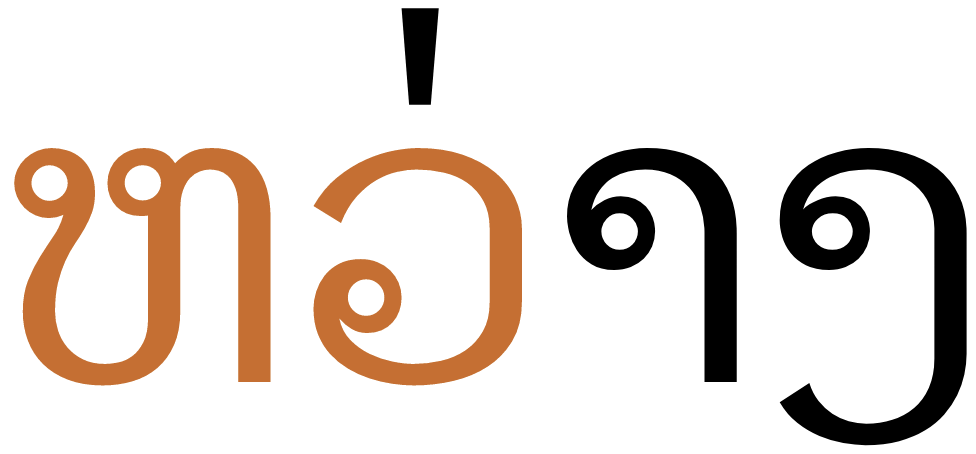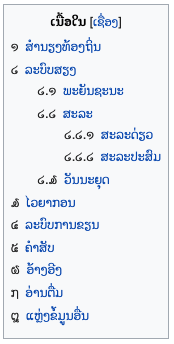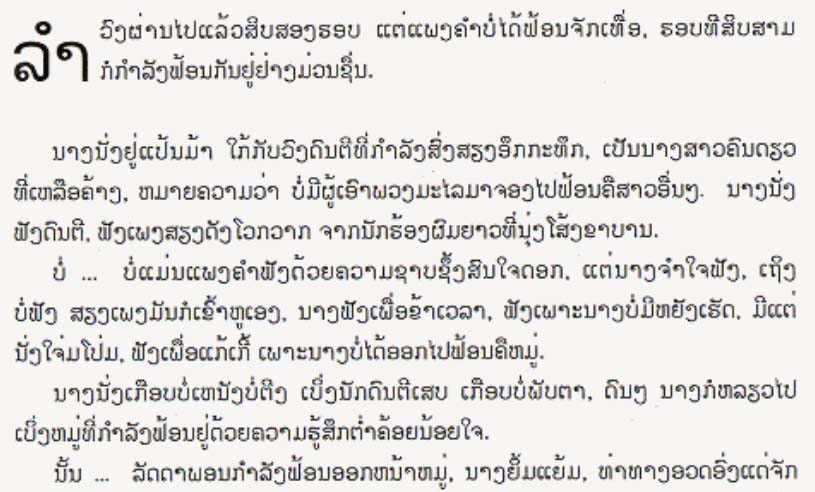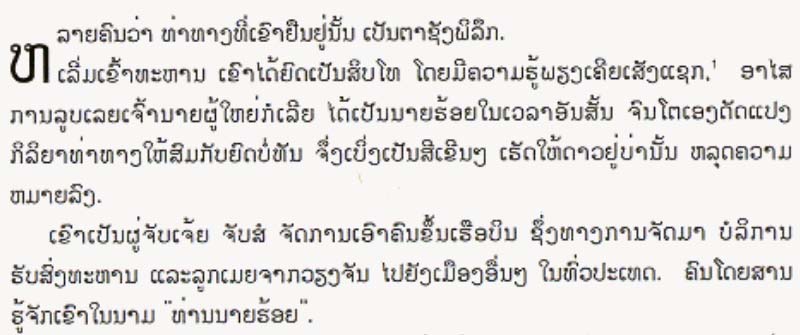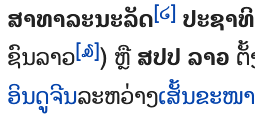Phonology
Click on the sounds to reveal locations in this document where they are mentioned.
Phones in a lighter colour are non-native or allophones.
Vowel sounds
Plain vowels
Complex vowels
| iə̯ iːə̯ iw iːw | ɯə̯ ɯːə̯ | uə̯ uːə̯ |
| ɤːj | ||
| ɛw ɛːw | ||
| aj aːj aw | ||
Consonant sounds
Initials
| labial | alveolar | post- alveolar |
palatal | velar | glottal | |
|---|---|---|---|---|---|---|
| stops | p b | t d | k | ʔ | ||
| aspirated | pʰ | tʰ | kʰ | |||
| affricates | t͡ɕ | |||||
| fricatives | f | s | x | h | ||
| nasals | m | n | ɲ | ŋ | ||
| approximants | ʋ/w | l | j | |||
| trills/flaps | r | |||||
 |
 |
 |
 |
 |
 |
Finals
| labial | alveolar | post- alveolar |
palatal | velar | glottal | |
|---|---|---|---|---|---|---|
| stop | p | t | k | ʔ | ||
| nasal | m | n | ŋ | |||
| approximant | w | j |
Tone
Lao has 6 phonological tones in unchecked syllables, and 4 in checked syllables.
| Name | Vowel | Final | Unchecked? | Checked? |
|---|---|---|---|---|
| Rising | ˨˦ or ˨˩˦ | ě | ✓ | |
| High | ˦ | é | ✓ | ✓ |
| High falling | ˥˧ | ê | ✓ | |
| Mid | ˧ | ē | ✓ | ✓ |
| Low | ˩ | è | ✓ | ✓ |
| Low falling | ˧˩ | e᷆ | ✓ | ✓ |
The tone depends on the class of the initial consonant in a syllable, the structure of the syllable, and whether or not a tone mark is applied to override the default.
Tone values vary depending on location in Laos. There is some disagreement about whether there are 5 or 6 tones in Vientiane, and the tables below show that different sources disagree on the tones produced. According to some, most dialects of Lao and Isan have six tones, those of Luang Prabang have five.wl
More details about tone values
The following tables present different descriptions of tone values in Lao for the Vientiane dialect. The first and third tables basically agree on the tone value, although the names of tones vary. The middle table shows some different tone values altogether. See a list of studies for Vientiane tones.
This diagram shows 5 tones with names corresponding to a mixture of the first two tables below.
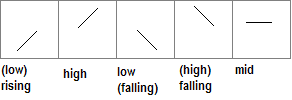
Tone marks are normally used only on open syllables, and modify the default tone value. Two of the four tone marks are only used with Class 1 consonants. Tone marks tend to be placed directly over the consonant (or superscript vowel), unlike Thai which tends to place them slightly to the right.
Open or live syllables are those that end with a long vowel or sonorant (eg. ງນມຍວ). Closed or dead syllables end with a stop consonant (eg. ກດບ) or short vowel.
| Open | Closed short vowel |
Closed long vowel |
Tone mai eːk |
Tone mai toː |
Tone mai tiː |
Tone mai cat-ta-waː |
|
|---|---|---|---|---|---|---|---|
| Class 1 | low | ˊ high | ˆ low falling | ˉ mid | ˋ high falling | ˋ high falling | ˇ low rising |
| Class 2 | ˇ low rising | ˊ high | ˆ low falling | ˉ mid | ˆ low falling | - | - |
| Class3 | ˊ high | ˉ mid | ˋ high falling | ˉ mid | ˋ high falling | - | - |
Refs: Daniels
| Live | Dead short vowel |
Dead long vowel |
Tone mai eːk |
Tone mai toː |
Tone mai tiː |
Tone mai cat-ta-waː |
|
|---|---|---|---|---|---|---|---|
| Class 1 | ˋ low | ˇ rising | ˇ rising | mid | ˆ falling | ˊ high | ˇ rising |
| Class 2 | ˇ rising | ˇ rising | ˋ low | mid | ˋ low | - | - |
| Class3 | ˊ high | mid | ˆ falling | mid | ˆ falling | - | - |
Refs: Simmala
| Live | Dead short vowel |
Dead long vowel |
Tone mai eːk |
Tone mai toː |
Tone mai tiː |
Tone mai cat-ta-waː |
|
|---|---|---|---|---|---|---|---|
| Class 1 | low rising | high rising | low falling | high-mid | high falling | ||
| Class 2 | low rising | high rising | low falling | high-mid | low falling | ||
| Class3 | high rising | high-mid | high falling | high-mid | high falling |
Refs: SEAlang
The Simmala chart appears a little suspect, since they say in the text that the rising tone doesn't occur in dead syllables, and yet the book has examples of dead syllables with long vowels with a low tone.
Structure
The syllable is a basic element of the Lao language, and many words are monosyllabic. All syllables begin with a written consonant. Syllables that begin with a vowel sound are written with a silent base consonant.
The phonological structure of a syllable is (C)w?V(C).
Unlike Thai, its close neighbour linguistically, Lao doesn't naturally support onset clusters of consonants other than with ʷ, and then not before rounded vowels.wl,#Syllables Onset consonants followed by labialisation include: tʷʰ tɕʷ kʷ kʷʰ ʔʷ sʷ ŋʷ lʷ.
Only a small set of consonants occur at the end of a syllable. ʔ occurs after short vowels.
Lao also has 6 phonological tones in unchecked syllables (ie. ending in a vowel, or m, n, ŋ, w or j), and 4 in checked syllables (ie. ending in p, t, k, or ʔ).
